In a significant development, the Rashtriya Swayamsevak Sangh (RSS), the ideological backbone of the ruling Bharatiya Janata Party (BJP), has initiated a national campaign advocating for the renaming of India to Bharat, a name rooted in the country’s civilizational heritage.
This month-long campaign, set to kick off in March, is spearheaded by the RSS-affiliated Shiksha Sanskriti Utthan Nyas, which also played a pivotal role in shaping the National Education Policy. The initiative aims to gather 10 lakh signatures from citizens across various sectors—including education, government, law, and industry—before submitting a petition to President Droupadi Murmu.
Renaming India to Bharat: A Sentiment of Legacy
Atul Kothari, the national general secretary of Nyas, explained the deeper cultural and historical significance behind the name Bharat, stating, “India is merely a name, whereas Bharat is a sentiment, a legacy passed down by our ancestors.” The campaign seeks to push for a constitutional review, urging the government to adopt Bharat as the official name of the country, reinforcing its historical and cultural identity.
The movement has garnered strong institutional support from senior RSS leaders, including General Secretary Dattatreya Hosabale and Joint General Secretary Krishna Gopal, who attended the event in New Delhi.
The G20 Summit Sparked the Debate on Bharat vs India
The debate surrounding the use of India versus Bharat first gained widespread attention during the G20 Summit in September 2023. At the summit, Prime Minister Narendra Modi’s nameplate was marked “Bharat,” rather than “India,” and President Murmu sent official invitations under the title “President of Bharat.” This sparked speculation that the government might amend Article 1 of the Constitution, which currently states, “India, that is Bharat, shall be a Union of States.”
Despite the public discussion, no formal legislative action was taken at the time, but the conversation around renaming the country was revived, with the RSS now leading the charge.
Historical Background: Bharat vs India Debate
The debate over the country’s name dates back to the Constituent Assembly discussions in September 1949, where there was significant support for the name Bharat, drawing from ancient texts like the Vedas, Upanishads, Mahabharata, and Puranas. Notably, HV Kamath, a member of the Forward Bloc faction of Congress, proposed an amendment to Article 1 of the Constitution, suggesting that it read, “Bharat, or in the English language, India, shall be a Union of States.” The proposal was ultimately defeated, and the dual naming formula—India and Bharat—was adopted instead.
Since then, both names have coexisted in official documents, including passports, where “Republic of India” and “Bharata Ganarajya” are listed side by side. The latest push by the RSS has reignited the discussion, signaling that the debate over the country’s name could once again take center stage.























